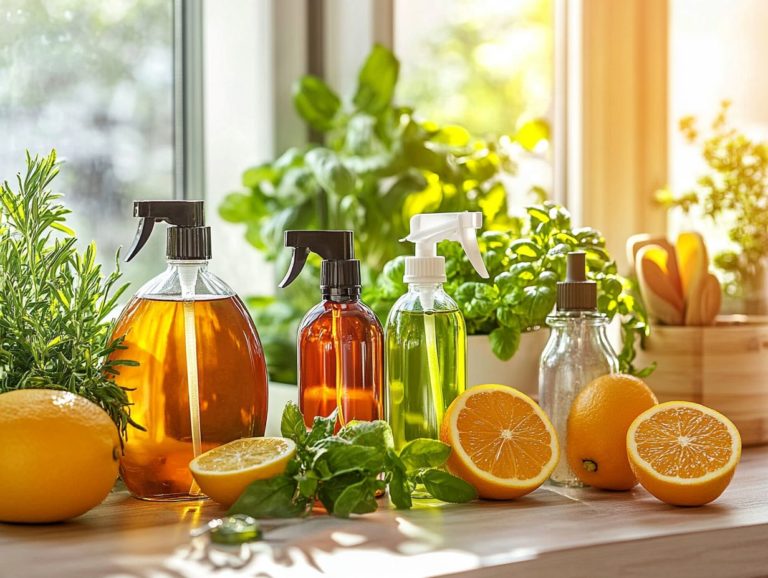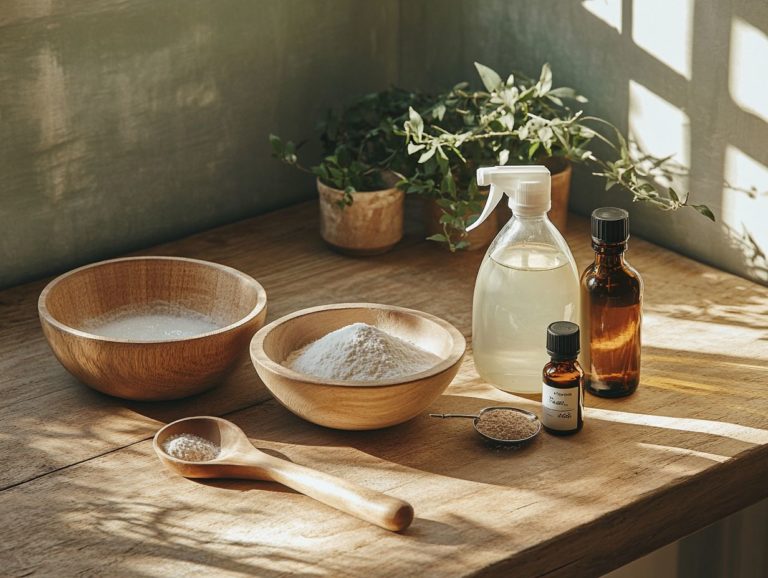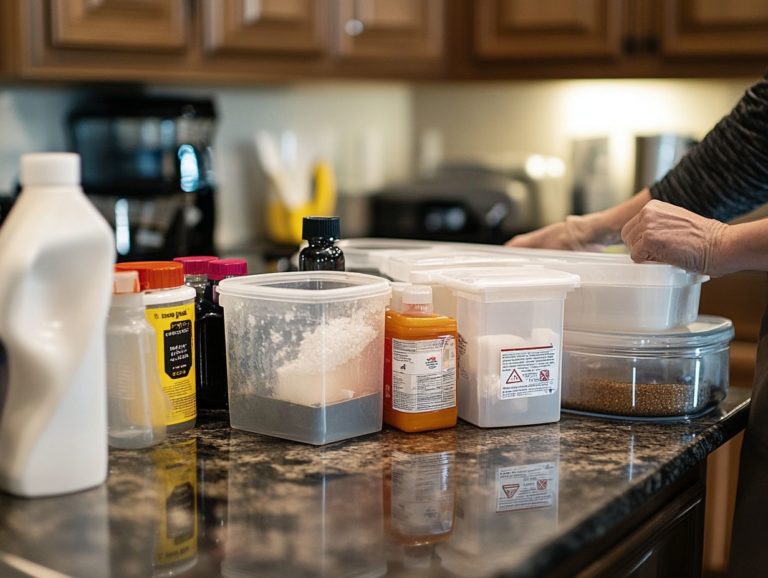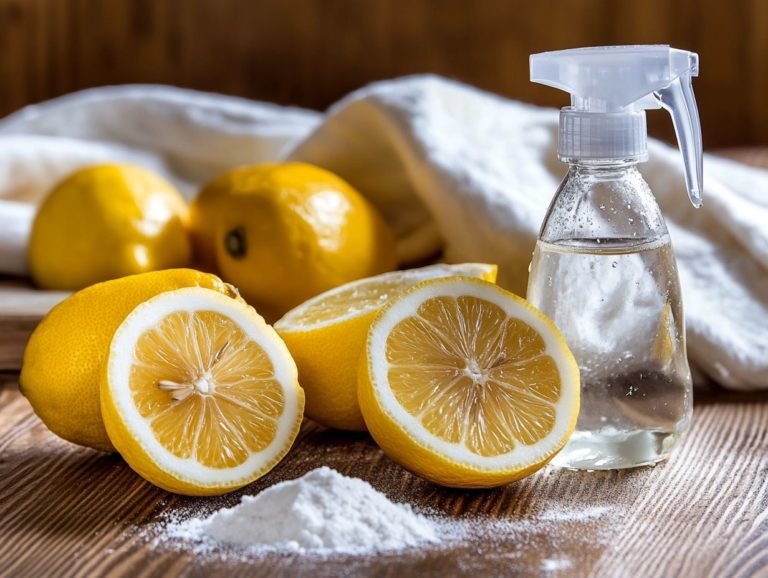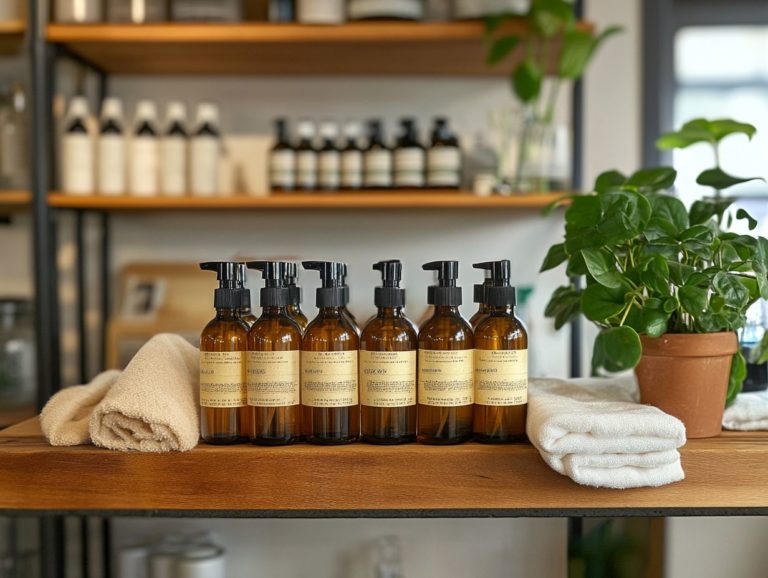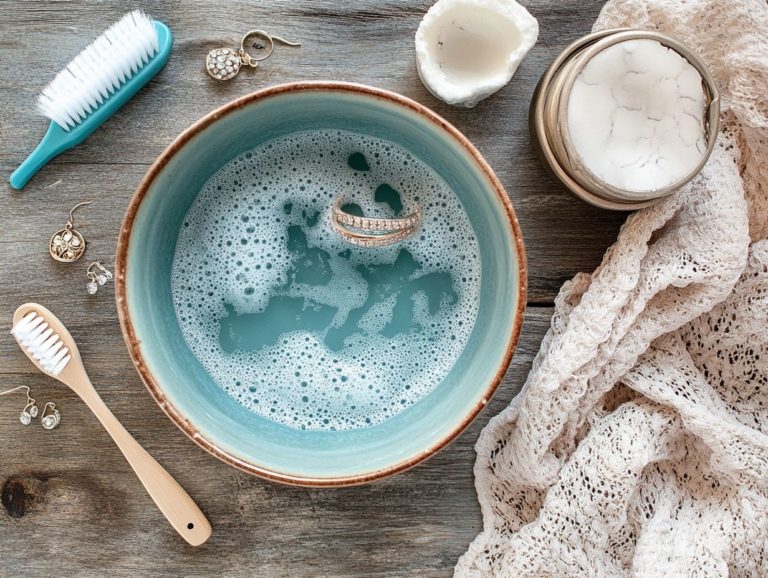What is the Shelf Life of Homemade Cleaners?
In a world increasingly focused on sustainability and health, homemade cleaners are becoming your go-to solution for a cleaner home. They enhance both personal care and household sanitation.
These eco-friendly alternatives help you save money and minimize your exposure to harsh chemicals and toxic ingredients that linger in commercial products.
This article delves into the realm of homemade cleaners, highlighting common ingredients you can easily find and the myriad benefits they bring to your household. We also include insights from experts like The Health + Mindset Collective and Lauren Wellbank.
You’ll learn how to store these concoctions properly, identify when they ve reached their expiration date, and implement safe disposal methods. This ensures overall cleaning product safety and shelf life management.
Prepare to transform your cleaning routine into something cleaner, greener, and healthier! With these DIY natural products and effective cleaning tips, you’ll enjoy a fabulous fresh home.
Contents
- Key Takeaways:
- What Are Homemade Cleaners?
- Why Make Homemade Cleaners?
- What Are the Common Ingredients in Homemade Cleaners?
- 4. Essential Oils
- What Are the Benefits of Using Homemade Cleaners?
- What Is the Shelf Life of Homemade Cleaners?
- How to Properly Store Homemade Cleaners?
- How to Tell if Homemade Cleaners Have Expired?
- Are There Any Risks Associated with Using Expired Homemade Cleaners?
- Cleaning should be safe, efficient, and eco-friendly!
- How to Properly Dispose of Expired Homemade Cleaners?
- Frequently Asked Questions
- What is the Shelf Life of Homemade Cleaners?
- How long can I store homemade cleaners?
- What factors can affect the shelf life of homemade cleaners?
- Want to make your homemade cleaners last longer?
- What are some signs that homemade cleaners have expired?
- Are homemade cleaners safe to use after their shelf life has passed?
Key Takeaways:
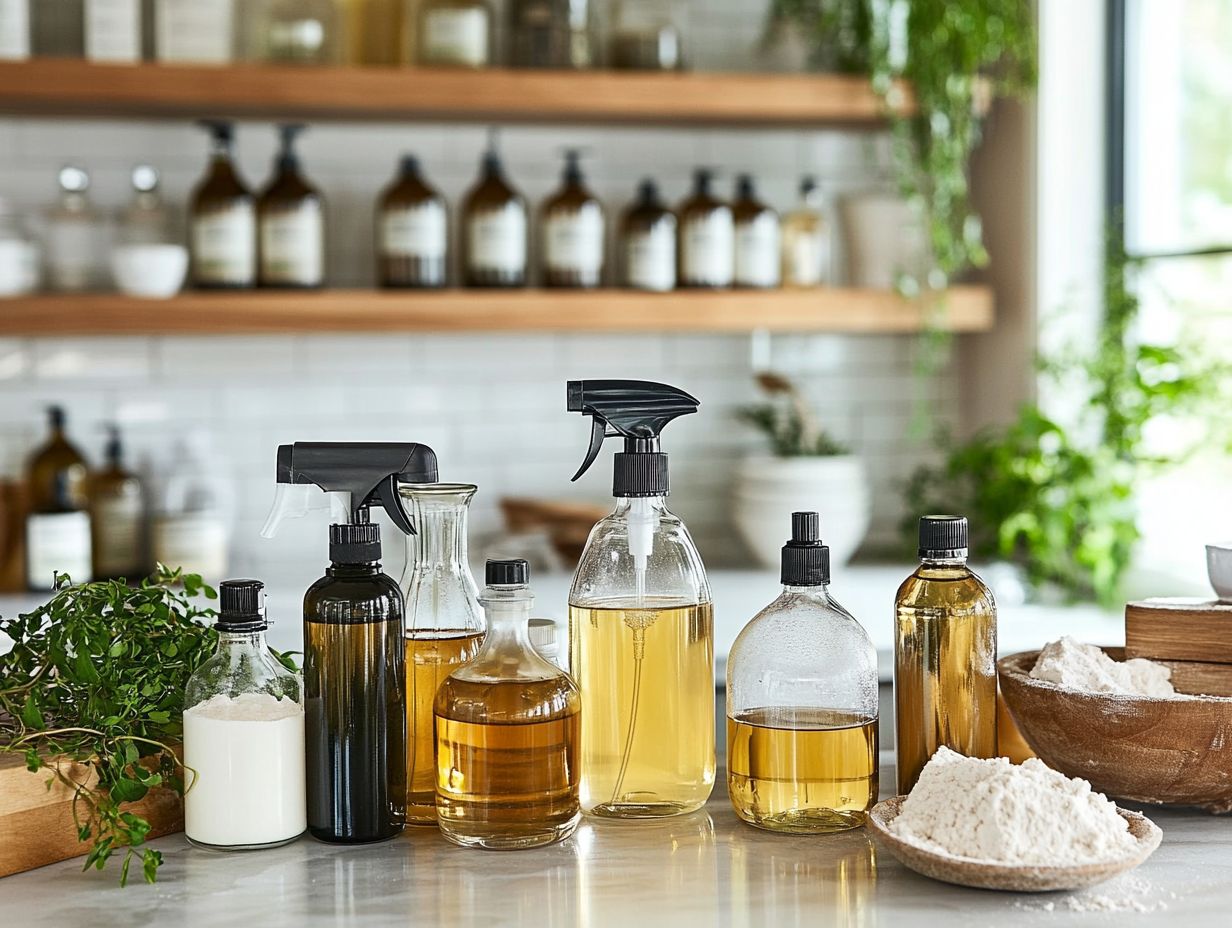
- Homemade cleaners are cost-effective, non-toxic, and environmentally friendly alternatives to store-bought cleaners, recommended by outlets such as The Washington Post and Better Homes & Gardens.
- The shelf life of homemade cleaners depends on the ingredients used, with vinegar-based cleaners lasting the longest and demonstrating excellent ingredient stability.
- To ensure the effectiveness of your homemade cleaners, store them properly and dispose of any expired ones to avoid potential risks, considering health precautions and cleaning product lifespan.
What Are Homemade Cleaners?
Insights from Experts
Homemade cleaners provide eco-friendly alternatives to commercial cleaning products. They are meticulously crafted from DIY natural ingredients that leverage everyday household items, ensuring effective cleaning without the harmful effects of toxic substances. Leading brands like Seventh Generation and Blueland champion this shift towards more sustainable cleaning practices.
More individuals are opting for these homemade solutions to enhance household sanitation while steering clear of harmful chemicals and preservatives commonly found in conventional cleaners, which can negatively affect your health. Noteworthy sources like Martha Stewart and Real Simple have extensively discussed the benefits of natural cleaning agents.
Why Make Homemade Cleaners?
Making your own cleaners saves you money and ensures you use safe ingredients. You also enjoy peace of mind knowing you’re positively impacting both personal health and the environment. Highlighted in publications like The Washington Post and Prevention, these DIY solutions foster a safer home environment.
Using ingredients like vinegar, baking soda, essential oils, and hydrogen peroxide allows you to create effective cleaners that are budget-friendly and safe. This enhances the overall sanitation of your household while extending the shelf life of your cleaning products.
What Are the Common Ingredients in Homemade Cleaners?
When crafting your homemade cleaners, consider the quintessential ingredients that elevate your cleaning game. Versatile substances like vinegar, baking soda, essential oils, hydrogen peroxide, and lemon juice are essential in enhancing the chemistry of your cleaning solutions.
These ingredients not only provide antibacterial and antifungal properties; they also ensure remarkable cleaning efficacy and ingredient stability. It s no wonder they ve become the go-to choices for those seeking to create premium DIY natural products with excellent health and environmental impact.
Start your journey towards a cleaner home today try making your first homemade cleaner!
1. Vinegar
Vinegar is an essential ingredient in your homemade cleaners. It is celebrated for its ability to kill germs and its remarkable ability to combat bacteria and mold growth.
This natural product is a fantastic and versatile cleaner that helps you tackle dirt and germs effortlessly. By incorporating vinegar into your daily cleaning routines, you can reap the rewards of an eco-friendly solution that is both affordable and easy to create.
Its acidic nature dissolves stubborn mineral deposits and grime. It also serves as a powerful deodorizer, leaving your spaces smelling fresh without harsh chemicals. The American Cleaning Institute frequently highlights vinegar for its effectiveness in various cleaning applications.
Consider these specific applications:
- Sparkle your windows to a shining clarity.
- Disinfect your kitchen surfaces with confidence.
- Effortlessly remove soap scum from your bathrooms.
You can use vinegar as a fabric softener alternative in your laundry. It reduces static cling while making your clothes feel softer a perfect illustration of how this humble ingredient can elevate your everyday cleaning tasks.
2. Baking Soda
Baking soda is your secret weapon for cleaning. It s celebrated for its dual powers as both a deodorizer and a mild abrasive.
This non-toxic ingredient is not only safe around children and pets, but it also enhances your homemade cleaners, adding to its charm. It s an excellent choice when you’re dealing with tough stains and grime.
Its versatility knows no bounds, allowing you to freshen up carpets and upholstery while tackling stubborn spots on countertops and sinks. When you combine baking soda with vinegar, prepare for a delightful bubbly reaction as it foams up, lifting dirt and grease with ease particularly effective for scrubbing kitchen surfaces and grout.
You can confidently use its gentle abrasive quality on delicate surfaces like glass or ceramics without worrying about scratches. Just ensure proper ventilation while you clean, and avoid mixing it with bleach for safety.
This eco-friendly option enables you to maintain a clean, fresh environment without resorting to harsh chemical cleaners, ensuring consumer health and cleaning product safety.
3. Lemon Juice
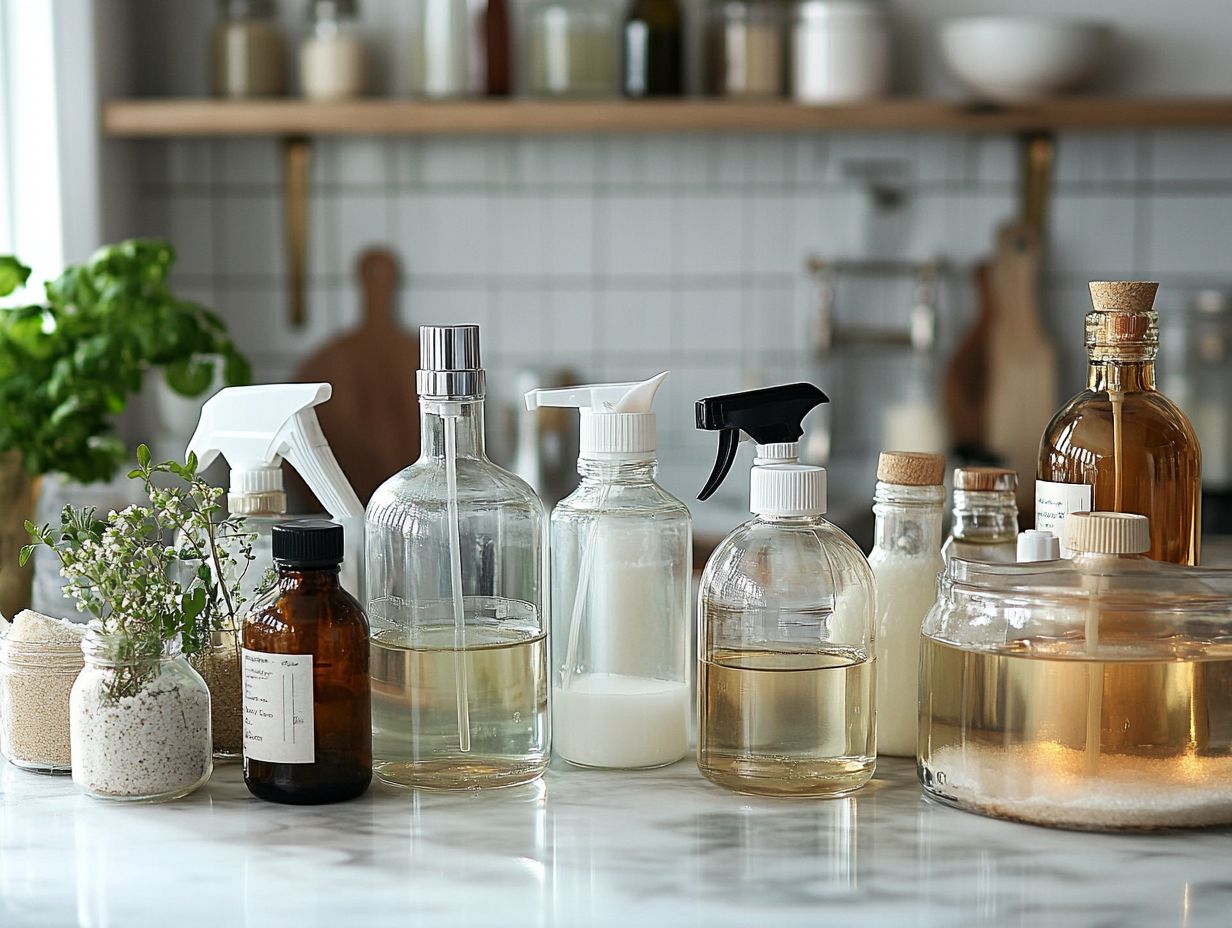
Discussed in various cleaning tips from sources like Better Homes & Gardens, lemon juice stands out as a potent household cleaner.
Lemon juice isn’t just your average kitchen staple; it’s a natural antibacterial powerhouse that adds a zesty scent and impressive whitening properties to your homemade cleaners.
Thanks to its acidic nature, it breaks down stains and grease, boosting the cleaning prowess of any DIY recipe you whip up. The brightening effect of lemon juice makes it a popular choice in many household cleaners.
This versatile juice pairs beautifully with simple ingredients like baking soda or vinegar, allowing you to concoct powerful cleaning solutions that can tackle even the most stubborn grime around your home.
When you incorporate lemon juice into your laundry routine, it s an amazing bleach alternative that brightens your laundry instantly without the need for harsh chemicals. Plus, its refreshing aroma not only freshens the air but also elevates your mood, transforming mundane chores into a more enjoyable experience.
By embracing the cleaning benefits of citrus, you adopt a safe approach that demonstrates natural products can be both effective and results-driven.
4. Essential Oils
Essential oils are remarkable organic extracts that not only infuse your space with delightful fragrances but also carry antimicrobial properties (that means they can kill germs and bacteria) that elevate the cleaning power of your homemade cleaners. By incorporating essential oils like tea tree, lavender, or eucalyptus into your recipes, you can achieve both sanitation and a refreshing aroma. Start using these oils today for a cleaner, healthier home! The Health + Mindset Collective frequently emphasizes the multi-faceted benefits of using essential oils in cleaning practices.
These natural powerhouses offer many benefits beyond their captivating scents. For instance, tea tree oil is renowned for its prowess in combating bacteria and fungi, making it an exceptional choice for disinfecting surfaces. Lavender not only uplifts your mood but also imparts calming effects, transforming the chore of cleaning into a more enjoyable experience. Eucalyptus, with its invigorating scent, has the added bonus of repelling pests while contributing to improved air quality and overall personal care.
By embracing the versatility of essential oils, you can craft effective, eco-friendly cleaning solutions that simplify your household tasks while fostering a healthier living environment.
What Are the Benefits of Using Homemade Cleaners?
Using homemade cleaners presents you with a multitude of advantages, such as cost-effectiveness, non-toxic formulations (cleaners that do not contain harmful chemicals), and eco-friendly ingredients that bolster your well-being. By choosing these DIY natural products, you can significantly minimize your exposure to harmful chemicals while ensuring your home remains pristine, ultimately fostering a healthier living environment for yourself and your loved ones. Publications like Prevention and Real Simple often highlight the health benefits and environmental impact of homemade cleaners.
1. Cost-effective
Homemade cleaners present a cost-effective solution that enables you to create your own cleaning supplies using inexpensive ingredients easily found around your home. This DIY strategy not only saves you money but also helps reduce the waste associated with commercial cleaning products.
By harnessing common household staples like vinegar, baking soda, essential oils, and hydrogen peroxide, you can effortlessly whip up effective cleaning solutions without the hefty price tags of store-bought alternatives. Not only does crafting your own cleaners save you money in the immediate term, but it can also lead to substantial long-term savings.
Over time, as you become more adept at creating your own formulas for everything from window cleaner to all-purpose sprays, you ll likely discover that your expenses are significantly lower than if you were regularly purchasing commercial products. Managing the shelf life of your DIY natural products keeps them effective for longer.
Moreover, homemade cleaners are free from harmful chemicals, fostering a healthier living environment and eliminating the need for pricey specialized items that promise to tackle tough stains or odors. Utilizing cleaning product usage guidelines ensures their effectiveness and longevity.
2. Non-toxic
One of the standout benefits of using homemade cleaners is their non-toxic nature, ensuring safety for you and your family. By steering clear of the harmful chemicals often lurking in commercial cleaning products, you can significantly diminish potential health risks and foster better overall well-being.
This transition to simpler, more natural ingredients not only elevates your indoor environment but also reduces the likelihood of respiratory issues, skin irritations, and other chronic health problems that may arise from long-term exposure to toxic substances. Many commercial cleaners contain ingredients that can trigger allergies or exacerbate existing health conditions, further underscoring the importance of choosing safe cleaning products.
Choosing homemade alternatives is an exciting way to boost your wellness and help the planet! Typically made with everyday staples like vinegar, baking soda, or essential oils, you embrace a more sustainable lifestyle that enhances both your wellness and the health of the environment.
3. Environmentally Friendly
Homemade cleaners are environmentally friendly alternatives that harness the power of natural products and biodegradable ingredients. They significantly reduce the ecological footprint associated with traditional cleaning supplies. Your commitment to eco-friendly practices allows you to maintain cleanliness in your home without contributing to environmental pollution.
You can easily create homemade cleaners from everyday items like vinegar, baking soda, and essential oils. This approach notably reduces plastic waste since these cleaners can be stored in reusable containers.
The use of biodegradable ingredients means that when these cleaners are washed away, they decompose naturally, posing minimal risk to the environment. Choosing homemade cleaning solutions puts you at the forefront of the eco-friendly revolution!
What Is the Shelf Life of Homemade Cleaners?
The shelf life of your homemade cleaners depends on the ingredients and formulation you choose. This directly influences their longevity and effectiveness.
Understanding how long your cleaners last is essential for ensuring that your cleaning solutions maintain their potency and remain safe for use. This knowledge will guide you in effective storage practices and proper disposal methods, allowing you to make the most of your eco-friendly creations.
1. Vinegar-Based Cleaners
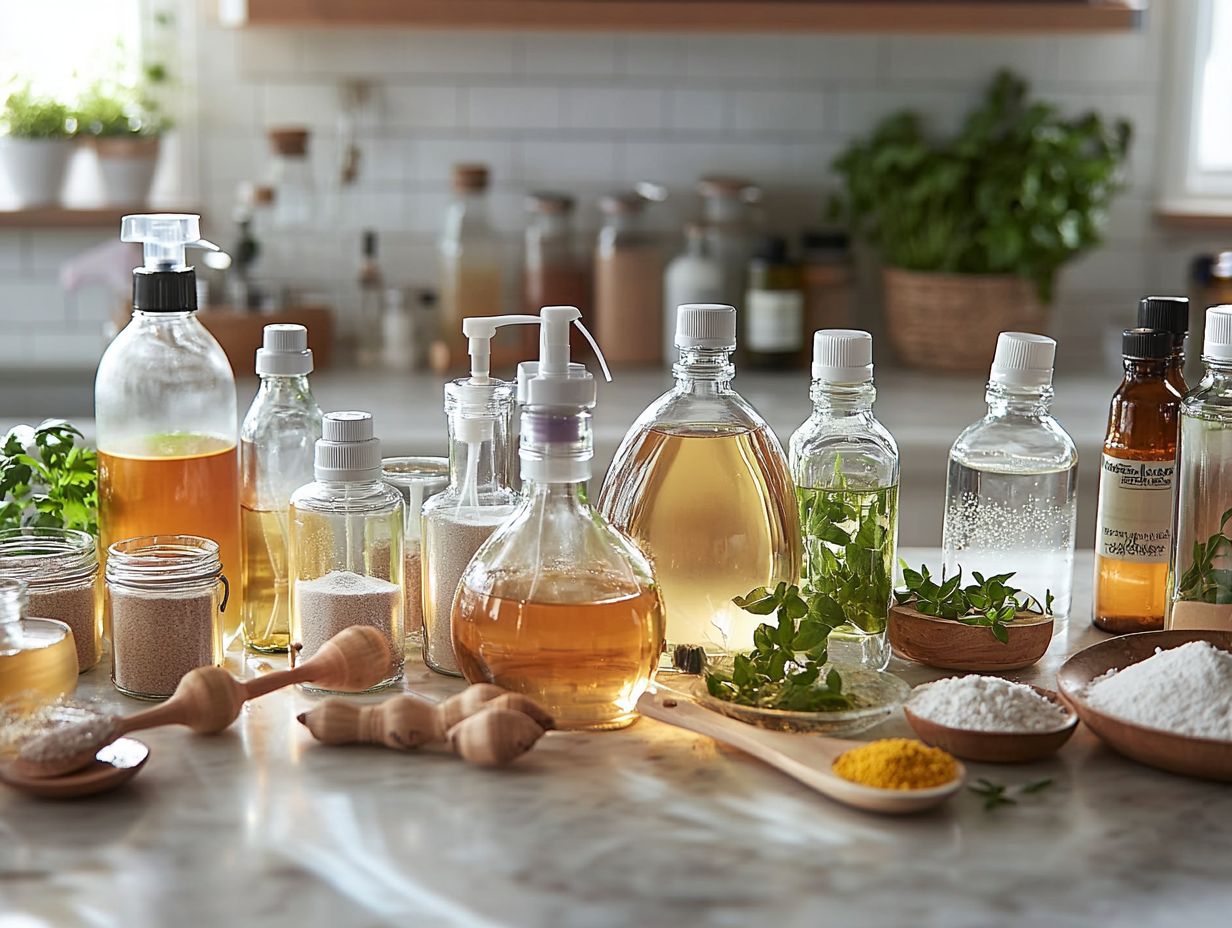
Vinegar-based cleaners often boast a remarkable shelf life, thanks to the natural acidity of vinegar. This acidity serves as a preservative and enhances the stability of the ingredients. By managing their shelf life properly, you can ensure that these cleaners remain effective for several months, as long as they are stored correctly.
To extend their longevity, keep them in a cool, dark place, away from direct sunlight and heat. These elements can degrade the components over time. Regularly inspect the cleaner for any changes in color, smell, or consistency, which may signal a loss of potency. If you notice a sour or off-putting odor, it might be time to consider replacing it.
Act now by following these simple storage tips to keep your vinegar-based cleaners effective and ready for action whenever you need them.
2. Baking Soda-Based Cleaners
Baking soda-based cleaners can also boast an impressive shelf life. However, exposure to moisture can undermine their effectiveness. To ensure your cleaning products remain safe and deliver optimal results, it s crucial to store them in a dry environment and remain vigilant for any ingredient interactions that may arise over time.
When kept in a cool, dry place shielded from direct sunlight, these cleaners can last for several years. Regularly inspect the packaging for any signs of clumping or unusual odors, as these may indicate that the product has started to degrade. If you notice the texture becoming lumpy or hard, it might not perform as well as you’d like.
Being aware of the expiry date, if provided, enables you to make informed decisions about when to replace your products. This ensures consistent cleaning power every time.
3. Lemon Juice-Based Cleaners
Lemon juice-based cleaners tend to have a shorter shelf life, primarily due to the natural degradation of the juice over time. This impacts the stability of its ingredients and overall cleaning effectiveness. To maximize their utility, prepare these solutions in small batches and store them in a cool, dark place.
This strategy helps preserve the potency of the cleaning agents and ensures that the pH level remains balanced. A balanced pH enhances their antibacterial properties. The acidity in lemon juice serves as a natural disinfectant, making it particularly effective for cutting through grease and eliminating odors on various surfaces.
When stored properly in airtight containers, these cleaners can maintain their freshness for about a week. To further extend their shelf life, consider incorporating a natural preservative like vinegar. This addition can inhibit bacterial growth and prolong the effectiveness of your cleaning solution while keeping it eco-friendly.
4. Essential Oil-based Cleaners
Essential oil-based cleaners can have a respectable shelf life, largely influenced by the quality of the oils and their unique properties. When these cleaners reach their expiration date, it’s crucial to dispose of them properly to avoid any risks associated with using ineffective or degraded solutions.
Several factors can significantly affect the longevity of these eco-friendly cleaners, including storage conditions like temperature, light exposure, and humidity levels. By storing them in dark, cool places away from direct sunlight, you can help maintain the potency of the essential oils, thus prolonging their effectiveness.
Understanding the right disposal methods is also vital. Pouring expired or unused cleaner down the drain can pose a threat to the environment. By paying attention to these elements storage and disposal you can ensure that your essential oil-based cleaning products remain not only safe but also effective throughout their intended usage period.
How to Properly Store Homemade Cleaners?
Proper storage of your homemade cleaners is essential for maintaining the stability of ingredients and ensuring a longer lifespan, which ultimately boosts their cleaning effectiveness. By adhering to specific storage guidelines, you can keep your DIY natural products safe and potent for an extended period.
To optimize storage, make it a priority to keep these cleaners in a cool, dark place, ideally away from direct sunlight and heat sources that could degrade their components over time. Aim for a storage temperature between 50 F and 70 F for the best results.
Choosing the right containers is also crucial; amber or cobalt blue glass bottles not only shield the contents from light exposure but also help preserve the integrity of essential oils and other sensitive ingredients. While plastic containers can be an option, ensure they are BPA-free to avoid any chemical leaching.
Regularly inspecting your homemade cleaners for changes in odor, consistency, or color will allow you to assess their effectiveness and safety, ensuring that they remain reliable allies in your cleaning arsenal.
How to Tell if Homemade Cleaners Have Expired?
Identifying expired products among your homemade cleaners requires a keen eye and a solid understanding of the signs that indicate a loss of potency, which can compromise both safety and effectiveness. By familiarizing yourself with the visual, olfactory, and performance indicators, you can ensure that you re using cleaning solutions that are both effective and safe for your health.
One key sign to keep an eye on is any change in color or consistency. For example, if a liquid cleaner becomes cloudy or develops sediment, it s a clear hint that it may no longer be up to the task. If the familiar, pleasant scent has turned sour or vanished entirely, that s another red flag that the active ingredients might have degraded.
Lastly, always assess the cleaner s performance: if surfaces remain dirty after application, it s a definite sign that its potency has waned, and it s time to dispose of it for both safety and effectiveness.
Are There Any Risks Associated with Using Expired Homemade Cleaners?
Using expired homemade cleaners can pose potential health risks, as these products may lose their effectiveness or undergo chemical changes that could lead to harmful ingredient interactions. It’s essential to understand the health impacts of using such products to maintain a safe and sanitary household environment.
Expired cleaners can become breeding grounds for bacteria or mold, particularly if they contain organic materials this could trigger respiratory issues or skin irritations when used. Changes in pH levels or the degradation of essential oils and acids can weaken the formula, making it less effective at eliminating germs and dirt.
This not only compromises the cleaning process but also increases the risk of introducing pathogens into your home. By using outdated solutions, you might unknowingly expose yourself and your loved ones to hazardous substances. This underscores the importance of regularly checking and updating your homemade cleaning products to ensure optimal safety.
Cleaning should be safe, efficient, and eco-friendly!
How to Properly Dispose of Expired Homemade Cleaners?
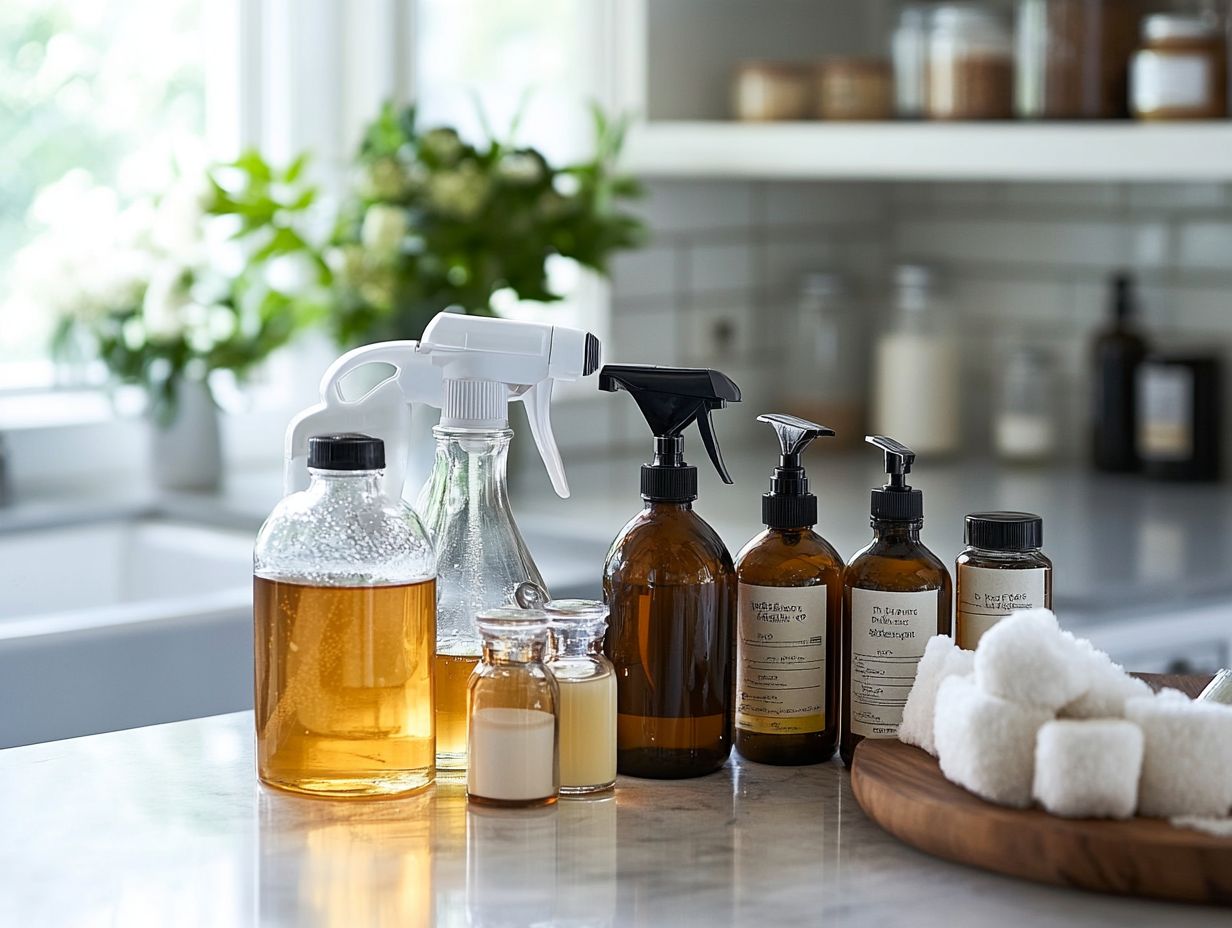
Proper disposal of expired homemade cleaners is crucial for ensuring your health and minimizing harm to the environment. By following eco-friendly disposal methods, you not only protect your own well-being but also adhere to recommended cleaning protocols for responsible waste management.
It s essential to remember that many homemade cleaners contain natural ingredients, which can still pose risks if not discarded correctly. Avoid pouring these mixtures down the drain or tossing them in the regular trash. This can lead to contamination of water systems and harm local ecosystems.
Instead, consider utilizing local hazardous waste drop-off centers that safely dispose of these substances. Keep track of product expiration dates, and regularly declutter your cleaning supplies. This practice fosters a safer home environment and supports sustainable practices by ensuring that only fresh, effective solutions are used for your cleaning tasks.
Frequently Asked Questions
What is the Shelf Life of Homemade Cleaners?
The shelf life of homemade cleaners can vary depending on the ingredients used. It is important to properly label and store your homemade cleaners to ensure their effectiveness and longevity.
How long can I store homemade cleaners?
The shelf life of homemade cleaners can range from a few weeks to several months, depending on the ingredients and storage conditions. It is best to use them within 1-3 months for optimal effectiveness.
What factors can affect the shelf life of homemade cleaners?
The main factors that can affect the shelf life of homemade cleaners are the ingredients used, the storage conditions (such as temperature and exposure to light), and the presence of any added preservatives.
Want to make your homemade cleaners last longer?
Yes, you can extend the shelf life of homemade cleaners by adding natural preservatives such as essential oils or using airtight containers to store them. However, it is best to make small batches and use them within a reasonable time frame.
What are some signs that homemade cleaners have expired?
Some signs that homemade cleaners have expired include a change in color, texture, or smell, and a decrease in effectiveness. Don’t risk your health! Always check your homemade cleaners regularly and replace old ones to avoid any potential risks.
Are homemade cleaners safe to use after their shelf life has passed?
It is not recommended to use homemade cleaners after their shelf life has passed. They may lose their effectiveness and potentially become harmful if bacteria or mold growth occurs. It is best to discard and make a fresh batch.

